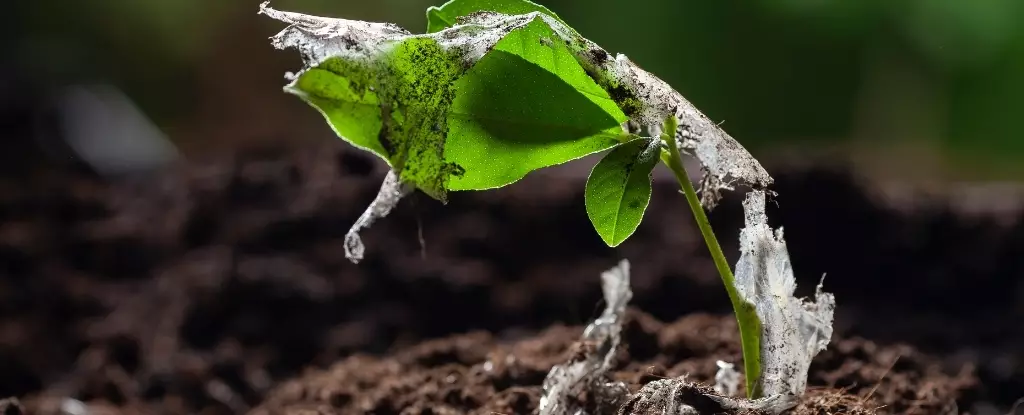The agricultural landscape is fast becoming a trove of hidden dangers, where the roots of our most beloved crops are entangled not just in soil, but in a toxic tangle of microplastics. This insidious problem, exposed by environmental biotechnologist Joseph Boctor and his dedicated research team at Murdoch University, reveals a concerning truth: the plastic crisis is not just a matter of litter swamping our oceans, but a dire threat infiltrating our home-cooked meals. Microplastics, those minute particles of plastic less than five millimeters in size, are now a byproduct of modern farming and a systemic failure we can no longer ignore.
Boctor’s extensive review of nearly 200 scientific papers lays bare the scale of the problem. It appears that microplastics have found their way into our soils through various channels, ranging from agricultural practices to the very fertilizers we deem safe. The alarming statistics suggest that hundreds of thousands of tons of these pollutants infiltrate European and North American farmlands annually, with countries like the UK shocking the world with figures of 22,500 tonnes of microplastics introduced yearly—solely through fertilizers and agricultural additives. Such ceaseless accumulation spells disaster not just for ecological health but also for human well-being.
Plastic Mulching: The Dichotomy of Efficiency and Ecological Harm
The adoption of plastic mulching, a technique praised for its efficiency in weed suppression and moisture retention, illustrates a troubling duality in our agricultural practices. While enhancing crop yields and promoting resource efficiency, this method stands as the primary vehicle for microplastics entering our food supply. Farmers, perhaps unknowingly, have become unwitting participants in a global experiment with dire implications as they cover the land with a plastic blanket that ultimately compromises soil health and public safety.
Studies have clearly indicated that the rising prevalence of plastic in soils directly translates to a rising prevalence of microplastics in food crops such as lettuce, carrots, and wheat. As these particles infiltrate the crops, they become potential carriers of hazardous additives and pollutants capable of leeching into the very foods we consume. This alarming reality calls into question the long-held belief that what we eat is healthy purely by virtue of being grown in the dirt. The soil, once a sanctuary for growth, is now, according to Boctor, transforming into a “plastic sink.”
From Farm to Table: The Contaminated Food Chain
But how do these rogue particles infiltrate the pristine world of fresh produce? Microplastics can be absorbed by plants through several mechanisms, including endocytosis—where plant cells effectively engulf particles from their environment. Moreover, these pollutants can find their way into crops via the air or through water uptake at the roots, fortifying the argument that our agricultural systems must be scrutinized more deeply. The consequences of this contamination are significant and unsettling, as they contribute to a larger narrative about food safety and public health.
Health research surrounding microplastics is painting a dire picture. Studies have linked these particles to a plethora of health issues ranging from fertility problems in men to hormone disruptions and even DNA damage. Particularly disturbing is the evidence suggesting that the toxic chemicals used in plastics—including phthalates, known for causing reproductive harm, and PBDEs, notorious for their links to cancer—can be transferred from mother to child during pregnancy. This extensive reach indicates a grim reality: the crisis of environmental contamination has morphed into a public health crisis.
Demanding Accountability and Transparency
Boctor’s impassioned plea to regulators to shine a light on this growing threat cannot go unheard or unheeded. The lack of transparency surrounding the prevalence of microplastics in our food supply highlights a gaping hole in both policy and research—a hole that permits these pollutants to persist within our ecosystems unchecked. As citizens, we must advocate for rigorous research, robust regulations, and sustainable agricultural practices to protect our health and future.
This issue transcends partisan divisions; it is about safeguarding the wellbeing of families, mothers, and children from the insidious threats lurking in our food. As consumers, there’s an urgent need to push for the accountability and transparency that will not only enlighten us about the sources of our food but also fortify the integrity of our food systems.
The time for awareness has passed; we must demand a revolution in our agricultural practices to confront the monstrous plastic crisis, one that threatens not just our environment, but our very existence.

